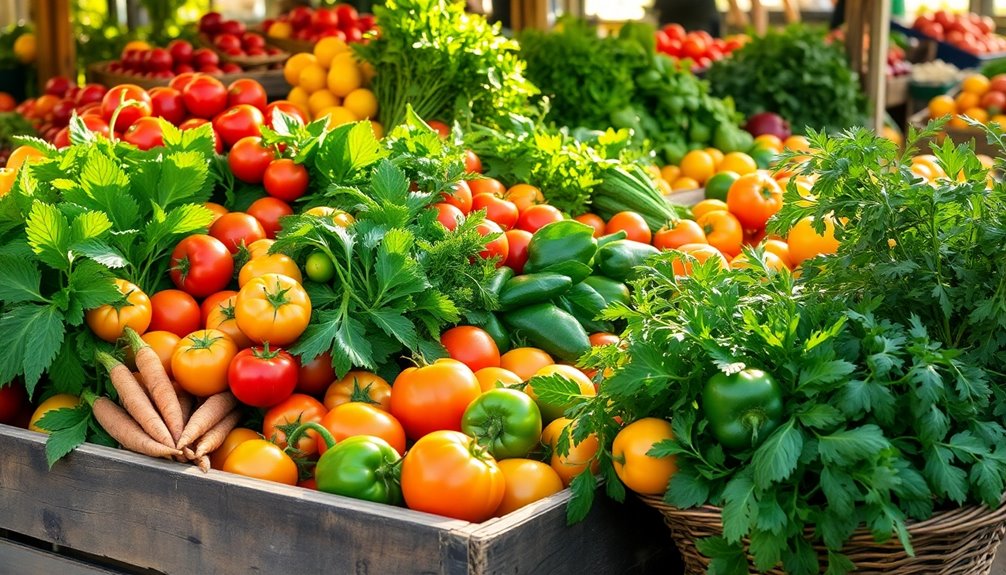Eating seasonal and local produce brings a host of benefits you won't want to miss. You'll enjoy enhanced flavors and higher nutrient content because these foods are fresh, ripe, and harvested close to home. Plus, by choosing local options, you're supporting farmers and boosting your community's economy. It also has a lower carbon footprint, promoting environmental sustainability and reducing waste. This encourages you to try new and diverse foods, making your meals exciting and healthy. If you're curious about how these choices can further enrich your life, there's more to explore on this journey of seasonal eating.
Key Takeaways
- Eating seasonal and local produce enhances flavor and nutrients, providing a superior taste experience and higher vitamin content.
- Choosing local produce reduces carbon emissions and supports sustainable agriculture, promoting environmental consciousness and biodiversity preservation.
- Supporting local farmers boosts economic growth, creates jobs, and fosters community connections, enriching local economies.
- Seasonal eating encourages a diverse diet, improves personal health, and aids in weight management by providing fresher and nutritious food options.
- Engaging with local markets and farmers cultivates community relationships, strengthens belonging, and fosters a vibrant local culture.
Enhanced Flavor and Freshness

Have you ever noticed how much better a tomato tastes in the summer compared to the winter? That's the magic of eating seasonal and local produce. When fruits and vegetables are harvested at their peak ripeness, they burst with flavor and nutrients. This isn't just about freshness; it's about a journey of taste exploration that opens up a world of culinary inspiration.
Seasonal produce is often grown nearby, which means it spends less time in transit and more time developing its unique flavors. For example, summer squash, picked under the warm sun, tastes sweeter and more vibrant than its winter counterpart that's been stored for months. When you bite into that ripe, juicy tomato in July, you're experiencing flavor in its truest form.
Embracing local and seasonal ingredients can transform your meals. Think about the colorful array of summer fruits at your farmers' market. Each one invites you to experiment, to create dishes that celebrate the season. You might find yourself inspired to whip up a fresh caprese salad or a simple tomato bruschetta, both of which highlight the ingredients' natural flavors. Additionally, incorporating plant-based recipes into your cooking can enhance the health benefits of eating seasonal produce.
Moreover, consuming seasonal produce fosters a sense of belonging within your community. Supporting local farmers not only strengthens your local economy but also connects you with the rhythms of nature. So, next time you're at the grocery store, consider opting for seasonal options. Your taste buds will thank you, and you'll be part of a larger movement that values freshness and flavor.
Nutritional Advantages
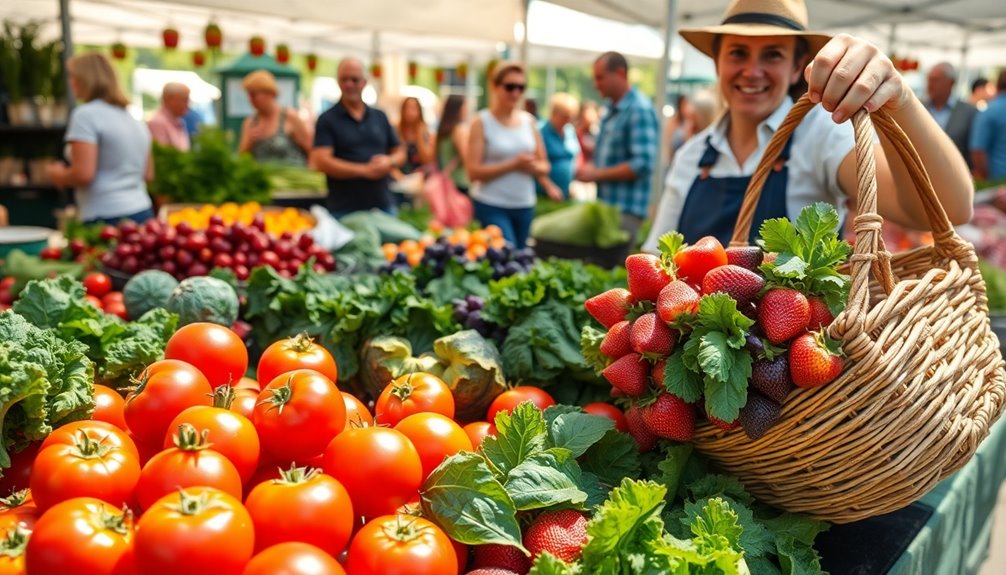
Eating seasonal and local produce not only enhances flavor but also offers significant nutritional benefits. When you choose fruits and vegetables that are in season and grown nearby, you're not just treating your taste buds; you're also nourishing your body. Here are four key health benefits you can enjoy:
- Higher Nutrient Content: Seasonal produce is often picked at peak ripeness, which means it's packed with vitamins and minerals. This freshness boosts its nutritional value compared to items that have traveled long distances.
- Better Flavor Profile: Locally sourced fruits and vegetables typically have a richer, more robust flavor. When crops are allowed to ripen naturally, they develop their full taste potential, making healthy eating more enjoyable.
- Reduced Chemical Exposure: Local farms often use fewer preservatives and chemicals than larger commercial operations. By eating seasonal produce, you're likely consuming fewer pesticides and additives, which is a win for your health.
- Increased Variety: Eating with the seasons encourages you to try new foods you mightn't have considered before. This variety can help you obtain a broader range of nutrients and keep your meals exciting. Additionally, making these dietary choices can play a role in preventing CKD progression, ensuring your overall health remains a priority.
Incorporating seasonal and local produce into your diet not only supports your health but also fosters a deeper connection with your community. Embracing these nutritional advantages is a simple yet powerful way to enhance your well-being while enjoying the vibrant flavors of your region.
Environmental Sustainability
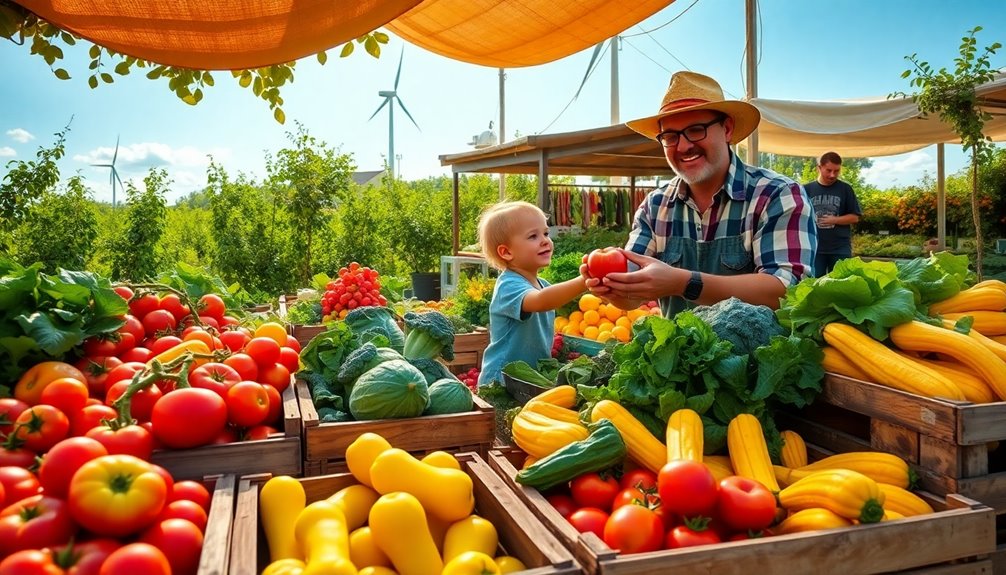
Sustainable agriculture plays an important role in preserving our environment, and choosing seasonal and local produce is one of the most impactful ways to support it. When you opt for fruits and vegetables that are in season and grown nearby, you greatly reduce waste. This is because local produce doesn't need to travel long distances, which lowers carbon emissions associated with transportation.
Moreover, supporting seasonal produce promotes biodiversity preservation. By eating a variety of foods that grow naturally in your region, you help maintain a diverse ecosystem. This diversity is vital for a resilient environment, as it supports different species and soil health.
Here's a quick comparison of the environmental impact of local versus non-local produce:
| Aspect | Local Produce | Non-Local Produce |
|---|---|---|
| Carbon Footprint | Low | High |
| Waste Generation | Reduced Waste | Increased Waste |
| Biodiversity Contribution | Supports Biodiversity | May Harm Biodiversity |
| Community Engagement | Strengthens Local Ties | Distant Connections |
Supporting Local Economies
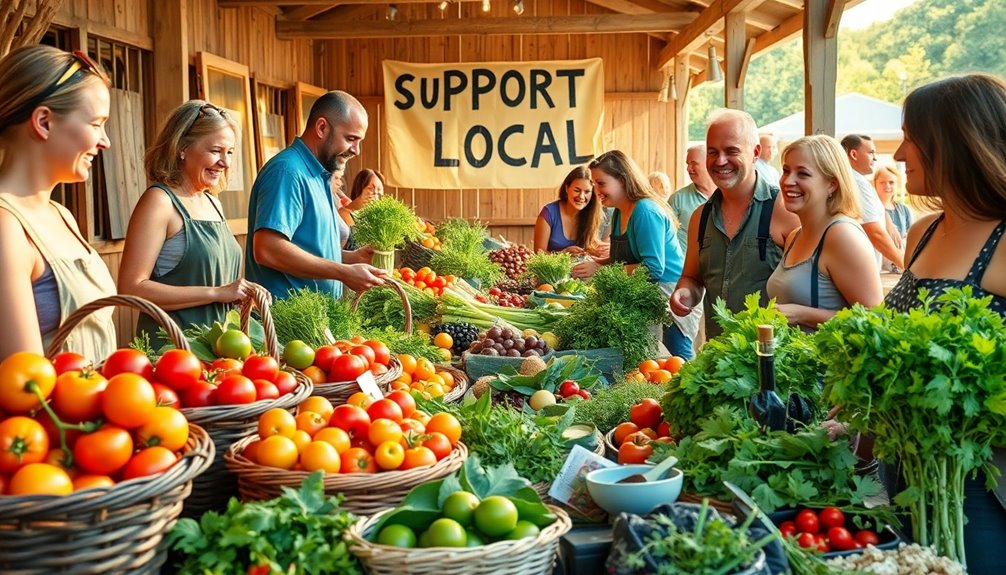
Choosing seasonal and local produce not only benefits the environment but also plays a pivotal role in supporting local economies. By purchasing from local sources, you help strengthen your community and foster economic growth. Here are a few key reasons why supporting local businesses through your food choices matters:
- Job Creation: Local farms and markets create jobs in your area, providing employment opportunities that keep money circulating within the community.
- Sustainable Practices: Local businesses often use sustainable farming methods, which can lead to healthier local ecosystems and a robust agricultural sector.
- Freshness Matters: When you buy seasonal produce, you're choosing fresher, tastier food. This not only enhances your meals but also reduces waste, as local farmers often have less spoilage compared to large-scale operations.
- Community Connection: Supporting local produce fosters a sense of belonging. You get to know the farmers and producers, creating a stronger bond within your community.
When you make the conscious choice to support local businesses, you're helping to build a vibrant local economy. Every dollar you spend on seasonal and local produce circulates within your community, allowing it to thrive. By prioritizing local sources, you not only nourish yourself but also contribute to a brighter, more resilient future for everyone around you. Additionally, these practices align with the concept of natural calorie cycles, promoting a healthier lifestyle. So, next time you shop, think local and experience the positive impact you can make!
Reduced Carbon Footprint
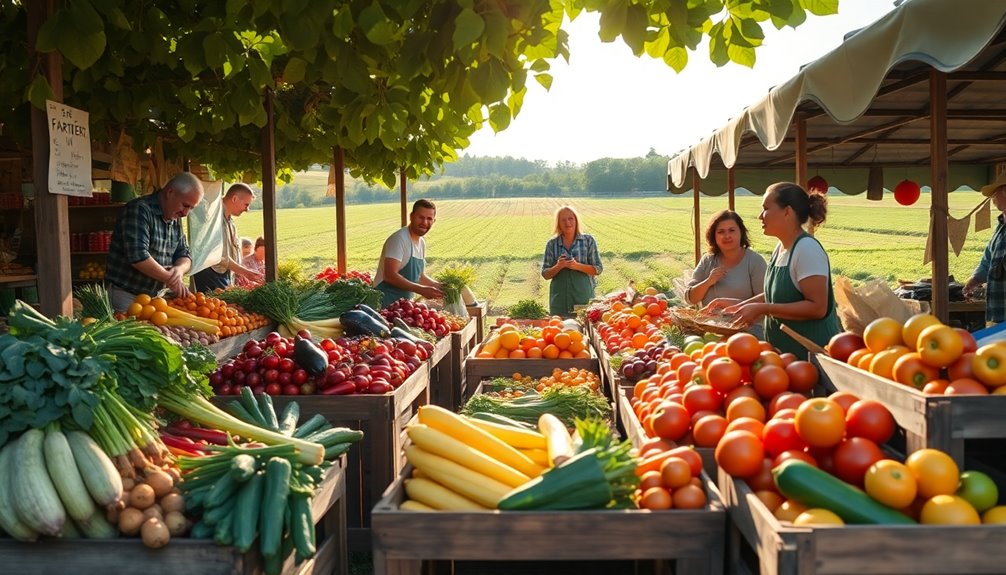
One significant advantage of opting for seasonal and local produce is the substantial reduction in your carbon footprint. When you choose fruits and vegetables that are grown nearby and harvested in their natural season, you minimize the need for long-distance transportation. This means fewer trucks on the road, less fuel burned, and a lower overall environmental impact. You're not just making a personal choice; you're actively contributing to a larger movement toward sustainability.
Additionally, local farmers often employ more eco-friendly practices compared to large-scale industrial farms. By purchasing from them, you're supporting methods that prioritize soil health and biodiversity, which can lead to healthier ecosystems.
The health benefits you receive from eating seasonal produce are also significant. Fresh, local fruits and vegetables are typically harvested at peak ripeness, which means they're not only tastier but also packed with nutrients. Eating seasonal produce can also aid in promoting rapid and healthy fat loss, making it a great addition to your dietary choices.
Eating in season also encourages a diverse diet, helping you connect with the cycles of nature and the community around you. When you share a meal made from locally sourced ingredients, you foster bonds with others who value sustainability and environmental consciousness. You're part of a community that prioritizes both personal health and the well-being of the planet.
Seasonal Variety and Creativity
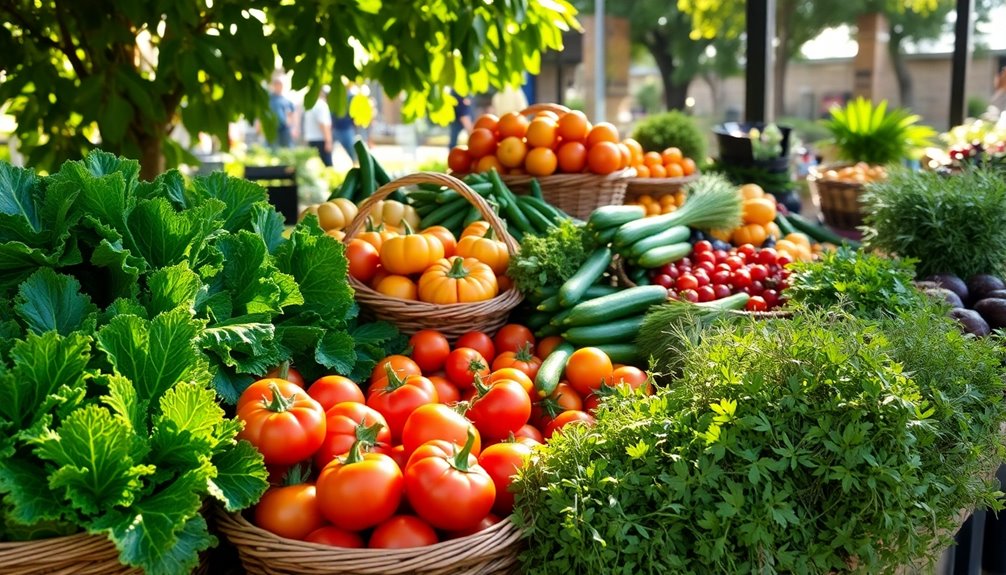
Exploring the rich variety of seasonal produce can spark your culinary creativity and elevate your meals. By embracing what's in season, you'll find that your cooking becomes more vibrant and exciting. Seasonal fruits and vegetables not only taste better but also inspire fresh ideas for your menu planning. Here are four delicious ways to embrace seasonal variety:
- Experiment with New Recipes: Seasonal produce encourages you to explore recipes you mightn't have tried before. Think about incorporating fresh asparagus in spring or juicy tomatoes in summer.
- Create Colorful Plates: Eating with the seasons means your meals are packed with color and nutrients. A rainbow of produce not only looks appealing but also provides a diverse range of vitamins and minerals.
- Host Seasonal Dinner Parties: Share your culinary inspiration with friends by planning a dinner party focused on seasonal dishes. It's a great way to bond over food while showcasing the best of what's available.
- Join a Local CSA: Community Supported Agriculture (CSA) programs offer a variety of seasonal produce, often introducing you to unique ingredients that spark creativity in the kitchen.
As you incorporate seasonal produce into your menu planning, you'll discover just how much it can enhance your cooking experience. You'll feel a sense of belonging to a community that values fresh, local ingredients while enjoying the thrill of culinary exploration.
Economic Benefits for Farmers
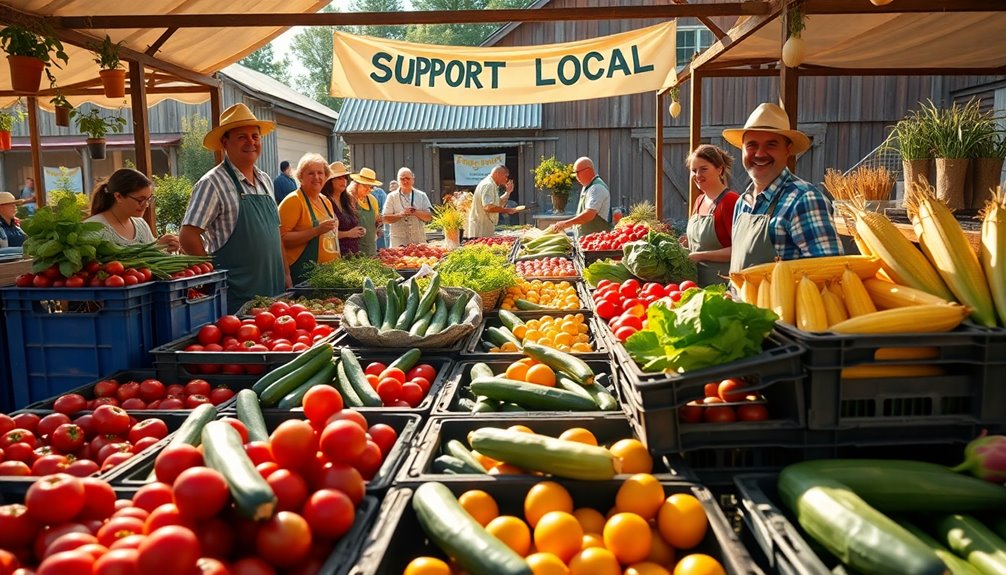
Embracing seasonal and local produce offers significant economic benefits for farmers, directly impacting their livelihoods and communities. When you choose to buy local, you're not just supporting your health; you're boosting the income of farmers in your area. This increased income allows them to invest in better farming practices, leading to agricultural growth that benefits everyone involved, including the environment.
Here's a quick look at how supporting local farms can make a difference:
| Economic Benefit | Description |
|---|---|
| Increased Income | Local sales often yield higher prices, enhancing farmers' profit margins. |
| Agricultural Growth | Farmers can reinvest profits into sustainable practices, improving crop yields. |
| Community Resilience | Stronger local economies reduce reliance on large corporations, fostering self-sufficiency. |
When farmers experience increased income, they can create jobs and stimulate local economies. This not only helps them thrive but also encourages agricultural growth, leading to more diverse offerings at local markets. You're not just purchasing food; you're investing in the community and its future.
Community Connection and Awareness
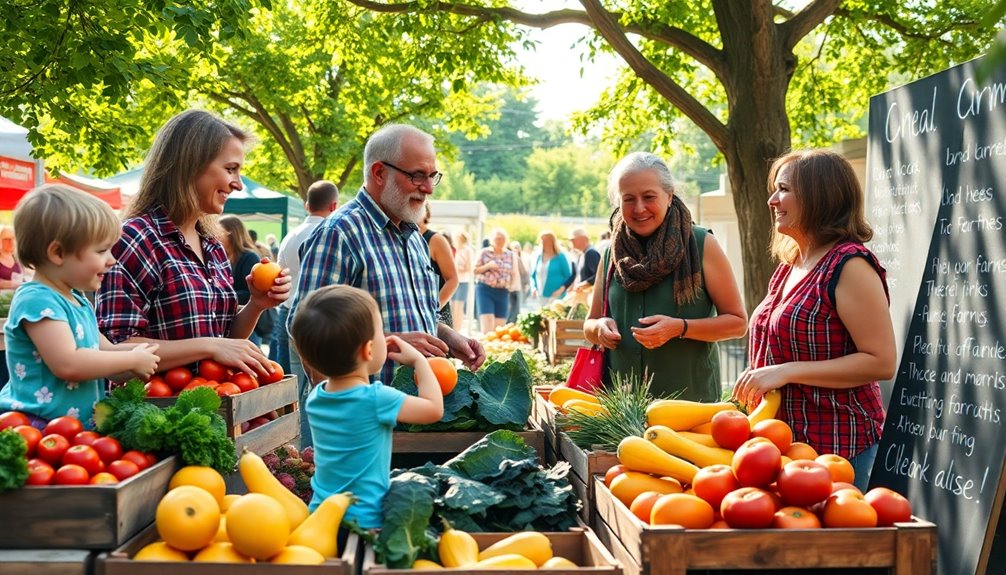
Community connection and awareness thrive when individuals support local produce. When you choose seasonal and locally grown food, you're not just nourishing your body; you're also fostering a vibrant community. Engaging with local farmers and markets cultivates relationships that strengthen your sense of belonging. Here are a few ways you can deepen that connection:
- Participate in Local Partnerships: Collaborate with local farms and businesses to create sustainable food systems. This not only benefits you but also fosters a thriving local economy.
- Attend Community Events: Join in on farmers' markets and local fairs. These gatherings provide opportunities to meet your neighbors, learn about local agriculture, and share in the joy of fresh produce.
- Engage in Education Programs: Many local organizations offer workshops on gardening, cooking, and nutrition. By participating, you'll enhance your knowledge and skills while connecting with like-minded individuals.
- Join Food Festivals: Celebrate the abundance of your region at food festivals. These events showcase local produce and often include cooking demonstrations, giving you a chance to taste and learn about the food you consume. Additionally, supporting local food initiatives can contribute to the development of sustainable food systems, which benefits the entire community.
Frequently Asked Questions
How Can I Find Local Farmers' Markets Near Me?
To find local farmers' markets near you, check out a farmers market directory online. These directories can help you discover local produce availability and connect with nearby markets. You'll not only enjoy fresh produce benefits but also find seasonal recipes that inspire your cooking.
Visiting these markets lets you connect with your community, support local farmers, and experience the joy of selecting vibrant, healthy ingredients for your meals.
What Are the Best Seasonal Fruits and Vegetables in My Area?
You might think finding the best seasonal fruits and vegetables is tough, but it's easier than you think! Check local farmers' markets for vibrant produce like strawberries in spring or squash in fall. Try out seasonal recipes that highlight these ingredients, making your meals fresh and exciting.
Remember to follow farmers' market etiquette, like arriving early and respecting vendors. This way, you'll feel part of a welcoming community while enjoying delicious, local food!
How Do I Store Seasonal Produce for Longer Freshness?
To store seasonal produce for longer freshness, you'll want to use proper preservation techniques. Start by washing and drying fruits and veggies, then consider freezing or canning them. Keep them in airtight containers to avoid spoilage.
Additionally, explore creative recipe ideas like homemade jams or soups to utilize your fresh finds. This way, you'll not only enjoy your produce longer, but you'll also share delicious meals with friends and family, creating a sense of belonging.
Are There Any Seasonal Produce Subscription Services Available?
When it comes to seasonal produce subscription services, you're in luck! Community supported agriculture (CSA) programs are popping up everywhere, offering fresh, local produce straight from the farm to your table.
You'll find various options for farm to table delivery that fit your needs. Not only do you get delicious fruits and veggies, but you also support local farmers and create a sense of community—talk about hitting two birds with one stone!
Can I Grow My Own Seasonal Vegetables at Home?
Yes, you can absolutely grow your own seasonal vegetables at home! Indoor gardening offers numerous benefits, like fresh produce right at your fingertips. Container gardening is a great option, especially if space is limited.
Start with easy-to-grow vegetables like tomatoes or herbs. Remember to choose the right containers, guarantee good drainage, and provide adequate sunlight.
With these tips, you'll cultivate a thriving garden that connects you with nature and enhances your meals.
Conclusion
By choosing seasonal and local produce, you're not just savoring vibrant flavors, but also reaping nutritional benefits that outshine their out-of-season counterparts. While your taste buds thrive, you're actively supporting local farmers and reducing your carbon footprint. This simple choice connects you to your community and fosters environmental sustainability. So, next time you shop, remember: what's fresh on your plate can nourish both you and the planet, creating a delicious harmony of health and responsibility.

